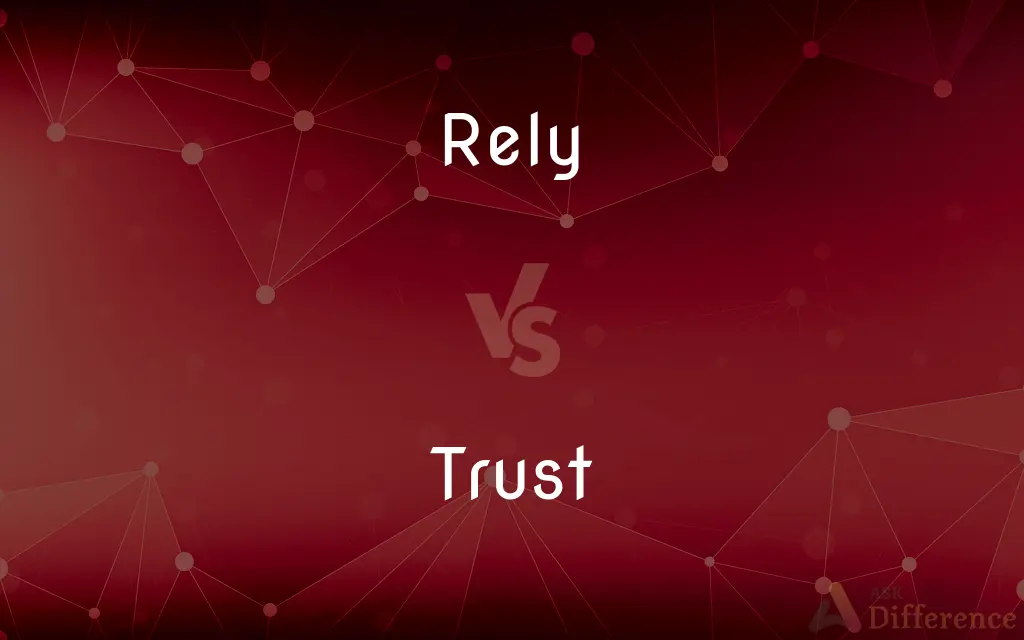Rely vs. Trust — What's the Difference?
By Maham Liaqat & Fiza Rafique — Updated on April 23, 2024
Rely implies dependence on something or someone for support, whereas trust involves confidence in the reliability, truth, or ability without constant verification.

Difference Between Rely and Trust
Table of Contents
ADVERTISEMENT
Key Differences
To rely on someone typically means to depend on them for support or assistance in practical matters. Whereas trust extends to a broader emotional or ethical confidence in someone's character or the truth of a statement.
Relying on someone often involves specific tasks or needs, while trusting someone encompasses a wider scope of belief in their overall integrity and reliability.
Relying may require continual proof or results, highlighting a more conditional aspect, whereas trust is generally more enduring, withstanding uncertainties without continual evidence. Trust can exist without reliance, as one might trust a person's morals without needing their help.
One can rely on someone's skills without fully trusting their intentions or honesty. Trust tends to be more challenging to rebuild once broken, compared to reliance which can be re-established with evidence of capability or reliability.
Comparison Chart
Definition
Dependence on someone or something for support.
Confidence in the reliability, truth, or ability.
ADVERTISEMENT
Emotional Connection
Generally lower; task-specific.
Generally higher; involves belief in character or integrity.
Durability
Conditional, based on continual proof.
More enduring, withstands uncertainties.
Independence
Less autonomous, requires support.
More autonomous, does not require support.
Restoration
Easier to re-establish with proof of capability.
Harder to rebuild once broken.
Compare with Definitions
Rely
Dependence on something or someone for support.
She relies on her weekly planner to manage her schedule efficiently.
Trust
To believe in the reliability or truth of something.
He trusts the scientific process.
Rely
Based on someone or something.
He relies on his intuition more than advice.
Trust
Expectation of honesty or reliability.
You should trust your instincts.
Rely
To trust for support or help.
I rely on my assistant to handle my appointments.
Trust
Confidence in the reliability, truth, or ability of someone or something.
I trust her judgment in business matters.
Rely
Using as a basis of support.
You can rely on solar energy for your power needs.
Trust
Dependence on the integrity or character of someone.
They put their trust in the company's ethics.
Rely
Needing or requiring support.
Relying on public transport can be challenging in rural areas.
Trust
Belief that someone is reliable and honest.
Trust between friends is fundamental.
Rely
To be dependent for support, help, or supply
Relies on her parents for tuition.
Trust
Firm belief in the integrity, ability, or character of a person or thing; confidence or reliance
Trying to gain our clients' trust.
Taking it on trust that our friend is telling the truth.
Rely
To place or have faith or confidence
Relied on them to tell him the truth.
Trust
The condition and resulting obligation of having confidence placed in one
Violated a public trust.
Rely
To trust; to have confidence in; to depend.
Trust
One in which confidence is placed.
Rely
Have confidence or faith in;
We can trust in God
Rely on your friends
Bank on your good education
I swear by my grandmother's recipes
Trust
Custody; care
Left her papers in my trust during her illness.
Trust
Something committed into the care of another; a charge
Violated a public trust.
Trust
Reliance on something in the future; hope
We have trust that the future will be better.
Trust
Reliance on the intention and ability of a purchaser to pay in the future; credit
Bought the supplies on trust from a local dealer.
Trust
A legal relationship in which one party holds a title to property while another party has the entitlement to the beneficial use of that property.
Trust
The confidence reposed in a trustee when giving the trustee legal title to property to administer for another, together with the trustee's obligation regarding that property and the beneficiary.
Trust
The property so held.
Trust
An institution or organization directed by trustees
A charitable trust.
Trust
A combination of firms or corporations for the purpose of reducing competition and controlling prices throughout a business or industry.
Trust
To have or place confidence in; depend on
Only trusted his friends.
Did not trust the strength of the thin rope.
Could not be trusted to oversee so much money.
Trust
To have confidence in allowing (someone) to use, know, or look after something
Can I trust you with a secret?.
Trust
To expect with assurance; assume
I trust that you will be on time.
Trust
To give credence to; believe
I trust what you say.
Trust
To place in the care of another person or in a situation deemed safe; entrust
"the unfortunate souls who trusted their retirement savings to the stock" (Bill Barnhart).
Trust
To extend credit to.
Trust
To have or place reliance; depend
We can only trust in our guide's knowledge of the terrain.
Trust
To be confident; hope.
Trust
Confidence in or reliance on some person or quality.
He needs to regain her trust if he is ever going to win her back.
To lose trust in someone
Build up trust
A relationship built on mutual trust
Trust
Dependence upon something in the future; hope.
Trust
Confidence in the future payment for goods or services supplied; credit.
I was out of cash, but the landlady let me have it on trust.
Trust
That which is committed or entrusted; something received in confidence; a charge.
Trust
That upon which confidence is reposed; ground of reliance; hope.
Trust
(rare) Trustworthiness, reliability.
Trust
The condition or obligation of one to whom anything is confided; responsible charge or office.
Trust
(legal) The confidence vested in a person who has legal ownership of a property to manage for the benefit of another.
I put the house into my sister's trust.
Trust
A group of businessmen or traders organised for mutual benefit to produce and distribute specific commodities or services, and managed by a central body of trustees.
Trust
(computing) Affirmation of the access rights of a user of a computer system.
Trust
(transitive) To place confidence in, to rely on, to confide in.
We cannot trust anyone who deceives us.
Trust
To have faith in; to rely on for continuing support or aid.
Trust
(transitive) To give credence to; to believe; to credit.
Trust
(transitive) To hope confidently; to believe (usually with a phrase or infinitive clause as the object)
I trust you have cleaned your room?
Trust
(transitive) to show confidence in a person by entrusting them with something.
Trust
(transitive) To commit, as to one's care; to entrust.
Trust
(transitive) To give credit to; to sell to upon credit, or in confidence of future payment.
Merchants and manufacturers trust their customers annually with goods.
Trust
To rely on (something), as though having trust (on it).
To trust to luck
Having lost the book, he had to trust to his memory for further details.
Trust
To risk; to venture confidently.
Trust
(intransitive) To have trust; to be credulous; to be won to confidence; to confide.
Trust
To sell or deliver anything in reliance upon a promise of payment; to give credit.
Trust
(obsolete) Secure, safe.
Trust
(obsolete) Faithful, dependable.
Trust
(legal) of or relating to a trust.
Trust
Assured resting of the mind on the integrity, veracity, justice, friendship, or other sound principle, of another person; confidence; reliance; reliance.
Most take things upon trust.
Trust
Credit given; especially, delivery of property or merchandise in reliance upon future payment; exchange without immediate receipt of an equivalent; as, to sell or buy goods on trust.
Trust
Assured anticipation; dependence upon something future or contingent, as if present or actual; hope; belief.
His trust was with the Eternal to be deemedEqual in strength.
Trust
That which is committed or intrusted to one; something received in confidence; charge; deposit.
Trust
The condition or obligation of one to whom anything is confided; responsible charge or office.
[I] serve him truly that will put me in trust.
Reward them well, if they observe their trust.
Trust
That upon which confidence is reposed; ground of reliance; hope.
O Lord God, thou art my trust from my youth.
Trust
An estate devised or granted in confidence that the devisee or grantee shall convey it, or dispose of the profits, at the will, or for the benefit, of another; an estate held for the use of another; a confidence respecting property reposed in one person, who is termed the trustee, for the benefit of another, who is called the cestui que trust.
Trust
An equitable right or interest in property distinct from the legal ownership thereof; a use (as it existed before the Statute of Uses); also, a property interest held by one person for the benefit of another. Trusts are active, or special, express, implied, constructive, etc. In a passive trust the trustee simply has title to the trust property, while its control and management are in the beneficiary.
Trust
A business organization or combination consisting of a number of firms or corporations operating, and often united, under an agreement creating a trust (in sense 1), esp. one formed mainly for the purpose of regulating the supply and price of commodities, etc.; often, opprobriously, a combination formed for the purpose of controlling or monopolizing a trade, industry, or business, by doing acts in restraint or trade; as, a sugar trust. A trust may take the form of a corporation or of a body of persons or corporations acting together by mutual arrangement, as under a contract or a so-called gentlemen's agreement. When it consists of corporations it may be effected by putting a majority of their stock either in the hands of a board of trustees (whence the name trust for the combination) or by transferring a majority to a holding company. The advantages of a trust are partly due to the economies made possible in carrying on a large business, as well as the doing away with competition. In the United States severe statutes against trusts have been passed by the Federal government and in many States, with elaborate statutory definitions.
Trust
Held in trust; as, trust property; trustmoney.
Trust
To place confidence in; to rely on, to confide, or repose faith, in; as, we can not trust those who have deceived us.
I will never trust his word after.
He that trusts every one without reserve will at last be deceived.
Trust
To give credence to; to believe; to credit.
Trust me, you look well.
Trust
To hope confidently; to believe; - usually with a phrase or infinitive clause as the object.
I trust to come unto you, and speak face to face.
We trustwe have a good conscience.
Trust
To show confidence in a person by intrusting (him) with something.
Whom, with your power and fortune, sir, you trust,Now to suspect is vain.
Trust
To commit, as to one's care; to intrust.
Merchants were not willing to trust precious cargoes to any custody but that of a man-of-war.
Trust
To give credit to; to sell to upon credit, or in confidence of future payment; as, merchants and manufacturers trust their customers annually with goods.
Trust
To risk; to venture confidently.
[Beguiled] by theeto trust thee from my side.
Trust
To have trust; to be credulous; to be won to confidence; to confide.
More to know could not be more to trust.
Trust
To be confident, as of something future; to hope.
I will trust and not be afraid.
Trust
To sell or deliver anything in reliance upon a promise of payment; to give credit.
It is happier sometimes to be cheated than not to trust.
Her widening streets on new foundations trust.
They trusted unto the liers in wait.
Trust
Something (as property) held by one party (the trustee) for the benefit of another (the beneficiary);
He is the beneficiary of a generous trust set up by his father
Trust
Certainty based on past experience;
He wrote the paper with considerable reliance on the work of other scientists
He put more trust in his own two legs than in the gun
Trust
The trait of trusting; of believing in the honesty and reliability of others;
The experience destroyed his trust and personal dignity
Trust
A consortium of independent organizations formed to limit competition by controlling the production and distribution of a product or service;
They set up the trust in the hope of gaining a monopoly
Trust
Complete confidence in a person or plan etc;
He cherished the faith of a good woman
The doctor-patient relationship is based on trust
Trust
A trustful relationship;
He took me into his confidence
He betrayed their trust
Trust
Have confidence or faith in;
We can trust in God
Rely on your friends
Bank on your good education
I swear by my grandmother's recipes
Trust
Allow without fear
Trust
Be confident about something;
I believe that he will come back from the war
Trust
Expect and wish;
I trust you will behave better from now on
I hope she understands that she cannot expect a raise
Trust
Confer a trust upon;
The messenger was entrusted with the general's secret
I commit my soul to God
Trust
Extend credit to
Common Curiosities
What is the difference between reliance and dependency?
Reliance specifically involves leaning on others for support, whereas dependency can imply a broader or more critical dependence.
How can trust be restored after it's broken?
Restoring trust usually requires consistent, reliable behavior and transparency over time.
Why is reliance considered conditional?
Reliance is considered conditional because it often depends on continuous proof or support.
How do reliance and trust affect personal relationships?
Both are crucial; reliance handles practical dependencies, while trust manages emotional and ethical expectations.
What makes trust more durable than reliance?
Trust is based on belief in someone’s character or integrity, which doesn’t frequently require verification.
What is the significance of trust in leadership?
In leadership, trust inspires confidence and loyalty, facilitating smoother management and operations.
What are the risks of relying on someone?
The risks include potential disappointment or failure if the person does not meet expectations.
What does it mean to rely on someone?
It means to depend on them for support or assistance.
Can I rely on someone I don't trust?
Yes, you can rely on someone's skills or contributions without fully trusting their intentions.
Is it possible to trust someone without relying on them?
Yes, you can trust someone's character or honesty without necessarily depending on them for support.
How does trust influence professional relationships?
Trust in professional settings fosters collaboration, integrity, and long-term success.
What factors can break trust?
Factors include dishonesty, inconsistency, and betrayal.
How is trust built?
Trust is built through consistent, reliable actions and transparency.
How can one maintain trust in a relationship?
Maintaining trust involves ongoing honesty, communication, and mutual respect.
Can reliance evolve into trust?
Yes, as reliance can build through consistent support, it can lead to developing trust.
Share Your Discovery

Previous Comparison
Mulberry vs. Sycamine
Next Comparison
Tamil vs. TeluguAuthor Spotlight
Written by
Maham LiaqatCo-written by
Fiza RafiqueFiza Rafique is a skilled content writer at AskDifference.com, where she meticulously refines and enhances written pieces. Drawing from her vast editorial expertise, Fiza ensures clarity, accuracy, and precision in every article. Passionate about language, she continually seeks to elevate the quality of content for readers worldwide.














































